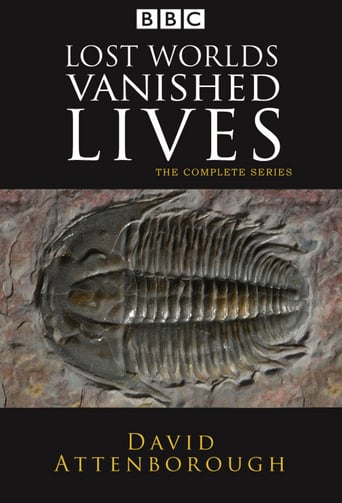TheLittleSongbird
As said many times, David Attenborough is a national treasure. He may apparently dislike the term, but it is hard to not say that about such a great presenter who has contributed significantly to some of the best programmes (of the documentary genre and overall) the BBC has ever aired/produced.It is really hard picking favourites, let alone a definite favourite, among what Attenborough has done because he has done so many gems, it is the equivalent of trying to choose your favourite ice cream flavour or your favourite operatic role (for examples) and finding you can't pick. 'Lost Worlds, Vanished Lives' may not quite emotionally connect with me or have the wide range of emotions the way Attenborough's wildlife documentaries do, but it is still exceptionally well made and fascinating. As far as documentaries on fossils and evolution go, it is also from personal opinion ground-breaking and important.'Lost Worlds, Vanished Lives' is very comprehensive, detailed and honest, is well-researched and doesn't make the mistakes of being one-sided or basing the information around poorly backed-up assumptions. Really cared for what was said and understood and appreciated fossils and evolution far more watching it. That's part of the beauty of Attenborough documentaries, when it's a subject one is not so knowledgeable on or usually indifferent to his work sheds a whole new light on them, clears up misconceptions and makes one appreciate and understand them more. The same went for his documentaries on invertebrates and reptiles.As always with Attenborough, 'Lost Worlds, Vanished Lives' looks great. It is beautifully filmed, done in a completely fluid and natural, sometimes intimate, way and never looking static. In fact much of it is remarkably cinematic with some of the shots being unique for a documentary series, making one forget that it is a series. The editing is always succinct and smooth.The music score fits very well, never overly grandiose while never being inappropriate while also being a beautiful score in its own right.Narration by Attenborough helps significantly. He clearly knows his stuff and knows what to say and how to say it. He delivers it with his usual richness, soft-spoken enthusiasm and sincerity, never talking down to the viewer and keeping them riveted and wanting to know more.Each part allows one to care for the information told and is structured and paced beautifully.In summary, fascinating and a must watch for better understanding of fossils and evolution as this is as comprehensive as one can get in learning more about them. 10/10 Bethany Cox
Jalish Mahmud Riyad
For any person interested to know about early life on earth and fossils,here you are....Being served by David Attenborough in the best possible way...When I first got this series, I wasn't much excited as I always am to see a David Attenborough special....but this man keeps surprising me....What an amazing journey towards the past of life on earth!!!Seriously,paleontology never seemed better...It's a regret that I've seen this after so many years.The specialty about this series (from all other Dino or ancient life-related series) is that it'll keep you glued (if you truly appreciate fossils and their significance).The gradual build-up of each of the episodes was just fascinating (well...not that much surprising actually,since it is none other than David ATTENBOROUGH who's hosting!!) After watching this show,you'll be able to better understand evolution and adaptation,for fossils are the direct evidence of evolution.I think it'll work even better if you watch this series and the 2010 "David Attenborough's First Life" series in close proximity,just as I have done.
